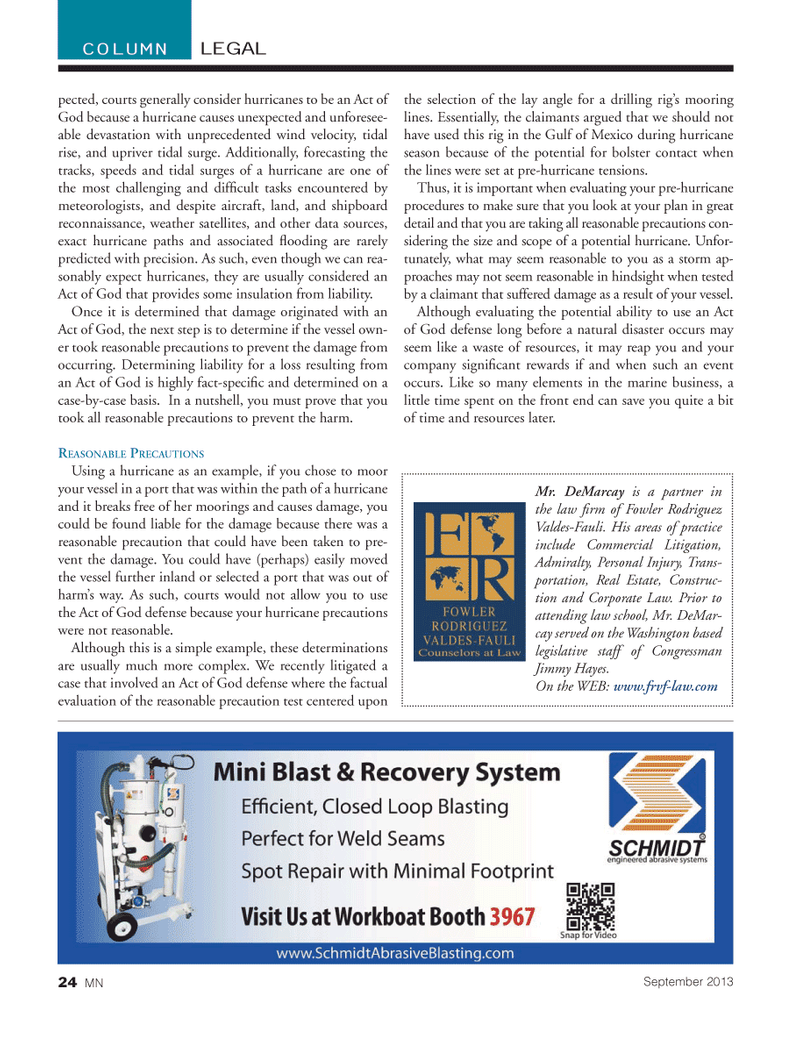
Page 24: of Marine News Magazine (September 2013)
Workboat Annual
Read this page in Pdf, Flash or Html5 edition of September 2013 Marine News Magazine
pected, courts generally consider hurricanes to be an Act of God because a hurricane causes unexpected and unforesee- able devastation with unprecedented wind velocity, tidal rise, and upriver tidal surge. Additionally, forecasting the tracks, speeds and tidal surges of a hurricane are one of the most challenging and dif? cult tasks encountered by meteorologists, and despite aircraft, land, and shipboard reconnaissance, weather satellites, and other data sources, exact hurricane paths and associated ? ooding are rarely predicted with precision. As such, even though we can rea- sonably expect hurricanes, they are usually considered an Act of God that provides some insulation from liability. Once it is determined that damage originated with an Act of God, the next step is to determine if the vessel own- er took reasonable precautions to prevent the damage from occurring. Determining liability for a loss resulting from an Act of God is highly fact-speci? c and determined on a case-by-case basis. In a nutshell, you must prove that you took all reasonable precautions to prevent the harm. REASONABLE PRECAUTIONS Using a hurricane as an example, if you chose to moor your vessel in a port that was within the path of a hurricane and it breaks free of her moorings and causes damage, you could be found liable for the damage because there was a reasonable precaution that could have been taken to pre- vent the damage. You could have (perhaps) easily moved the vessel further inland or selected a port that was out of harms way. As such, courts would not allow you to use the Act of God defense because your hurricane precautions were not reasonable. Although this is a simple example, these determinations are usually much more complex. We recently litigated a case that involved an Act of God defense where the factual evaluation of the reasonable precaution test centered upon the selection of the lay angle for a drilling rigs mooring lines. Essentially, the claimants argued that we should not have used this rig in the Gulf of Mexico during hurricane season because of the potential for bolster contact when the lines were set at pre-hurricane tensions. Thus, it is important when evaluating your pre-hurricane procedures to make sure that you look at your plan in great detail and that you are taking all reasonable precautions con- sidering the size and scope of a potential hurricane. Unfor- tunately, what may seem reasonable to you as a storm ap- proaches may not seem reasonable in hindsight when tested by a claimant that suffered damage as a result of your vessel. Although evaluating the potential ability to use an Act of God defense long before a natural disaster occurs may seem like a waste of resources, it may reap you and your company signi? cant rewards if and when such an event occurs. Like so many elements in the marine business, a little time spent on the front end can save you quite a bit of time and resources later. LEGALCOLUMNMr. DeMarcay is a partner in the law ? rm of Fowler Rodriguez Valdes-Fauli. His areas of practice include Commercial Litigation, Admiralty, Personal Injury, Trans- portation, Real Estate, Construc- tion and Corporate Law. Prior to attending law school, Mr. DeMar- cay served on the Washington based legislative staff of Congressman Jimmy Hayes. On the WEB: www.frvf-law.com September 201324 MNMN Sept2013 Layout 18-31.indd 248/29/2013 11:13:06 AM

 23
23

 25
25
